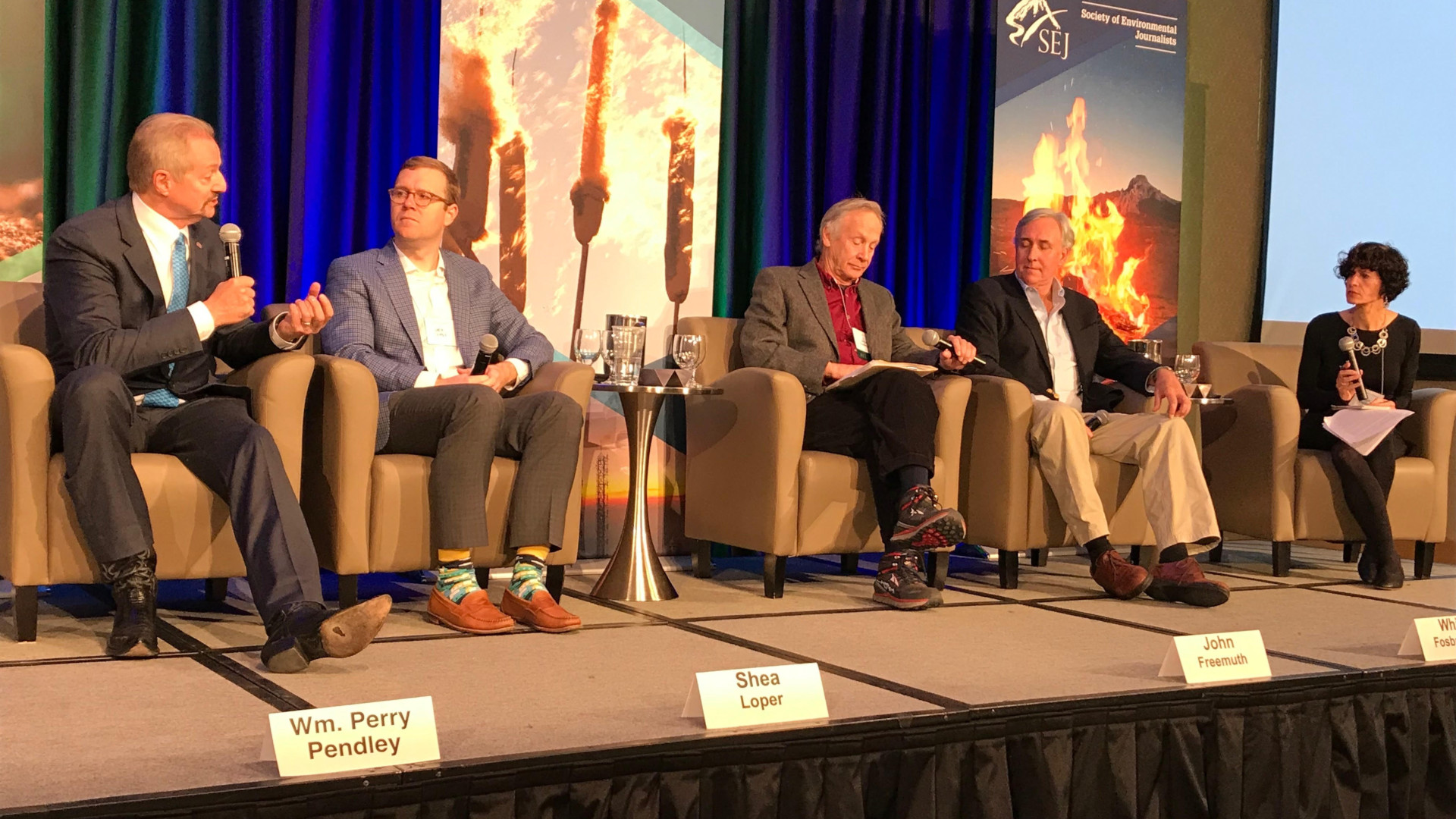William Perry Pendley wants you think that what he thinks doesn’t matter.
Pendley spent four decades advocating for the corporate exploitation of U.S. public lands. He now serves the Trump administration as the acting director of the Bureau of Land Management, the agency responsible for much of those same public lands.
Over the years Pendley, a self-styled “Sagebrush Rebel,” has pushed for the wholesale divestment of public lands from federal control, denied the existence of climate change and the hole in the ozone layer, denigrated the press, and called illegal immigrants a “cancer,” among other radical, extremist positions.
But now he’d have you believe that those actions and opinions no longer matter.
“My personal opinions are irrelevant,” Pendley said during an on-stage panel moderated by Juliet Eilperin of The Washington Post last week at the Society of Environmental Journalists annual conference in Fort Collins, Colo. “I have a new job now,” he told the audience. “I’m a zealous advocate for my client. My client is the American people, and my bosses are the president of the United States and Secretary Bernhardt. So what I thought, what I wrote, what I did in the past is irrelevant. I have orders, I have laws to obey, and I intend to do that.”
That appearance represented just one part of what appears to be a broader media strategy to rehabilitate Pendley’s image, including softball interviews for multiple publications and an op-ed for The Denver Post on the eve of the conference.
So what dominates Pendley’s opinions now? Well, he thinks the worst thing facing America’s public lands right now isn’t climate change — it is, in his opinion, wild horses.
But how would he know? During his SEJ appearance, throughout which he deflected a barrage of tough questions from the journalists in the audience, he admitted that BLM’s regional directors had yet to brief him about the already obvious local effects of climate change on public lands, many of which were cited by other panelists during the discussion.
I asked Pendley why he hasn’t been briefed on this, and if there were other issues on which he had also not been briefed.
His response: “Well, yeah, there’s a ton of topics I haven’t been briefed on, and one of the reasons is my recusals.”
Pendley, you see, has a 17-page list of ethical recusals — nearly 60 companies and groups that he used to represent in his role as president of the Mountain States Legal Foundation, an organization “dedicated to individual liberty, the right to own and use property, limited government, and free enterprise” which the Center for Media and Democracy calls “a training ground for a number of attorneys most active in the anti-environmental movement.”
These recusals include oil companies, energy companies and the National Mining Association, among many others. According to BLM ethical guidelines, Pendley is restricted from actions at the agency that would overlap with the interests of his prior clients, usually for a period of two years.
In other words, he’s not being educated about the issues that define his roles and responsibilities as head of the BLM, and he’s not ethically allowed to do much of that job anyway.
Pendley did continue to answer my question by saying that he’s just been cleared to start receiving briefings on a number of issues, but would not commit to saying when those briefings — most notably the ones on climate change — would occur. “When it pops up on my schedule,” he said about that timeline.
He didn’t seem too concerned, though. After all, he’s got horses to worry about — not to mention oil companies. Although Pendley’s list of recusals remains long, he obviously still finds himself more on the side of maintaining oil-drilling rights and jobs than the rights of the wildlife or climatory systems that depend on public lands. He called Democratic presidential candidates’ “Keep It in the Ground” pledges to stop new drilling “absolutely insane” and characterized oil drilling as a matter of “life or death” for western communities.
He also, in a question from Eilperin about the role of recreation on public land, conflated BLM’s role as a leasing agent of extraction rights with the companies doing the actual drilling and other activities. “We manage 245 million acres of land, 10 percent of the nation’s land mass, and we have a multiple use directive… We drill for oil. We mine coal. We cut trees. We allow ranchers to graze their cattle and their sheep on our lands. Your lands.”
Regardless of his past or present positions, the real measure of a person comes from their deeds, not their words. And Pendley’s rehabilitation tour isn’t all talk. It also obviously serves to build support for the ongoing plan to move much of the BLM away from Washington, DC, and into the West — a change opposed by BLM staff themselves but long supported and dreamed of by Pendley and other anti-federal appointees in the Trump administration. That plan grows closer every day, and when it happens many experts predict that federal control over public lands could begin to erode.
And that might prove to be Pendley’s most defining statement of all.
.@BLMDirector William Perry Pendley met with employees of @BLM_CO at the Colorado State Office in Denver yesterday, talking about the BLM HQ move to the state and answering questions. Snow was no problem for a WY native! pic.twitter.com/642xPOAZ32
— BLMNational (@BLMNational) October 11, 2019
![]()


